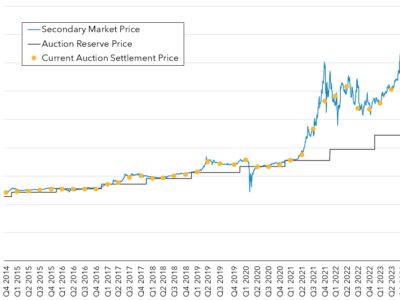Tipping Points and Feedback Effects

From the title, this could be a posting about the election results. It isn’t — although I do wonder whether the relatively rapid changes we’ve seen in the House over the past decade are a sign of increased feedback effects. My topic, however, is climate science.
The curve at the left shows how feedback effects can reinforce changes. RealClimate has another excellent post discussing the operation of feedback effects in the context of climate change. f is the feedback factor in this graph. Note that the effect of feedback grows quickly as the f approaches 1. As the RealClimate post points out the apparent climb to infinity is really an artifact because of linear approximation of feedback — actually, f=1 represents a tipping point into a new state.
Water vapor is the primary feedback effect on our planet. It seems to be a positive feedback — we know that small changes in solar feedback lead to large temperature changes rather than being eliminated through negative feedback– but we don’t know with great confidence the magnitude of the feedback effect or how it might change under different circumstances. Much of the uncertainty concerns reflection of sunlight from low-altitude clouds, which could counter warming. Current climate models suggest that the overall water vapor feedback is significant.
The risk, as shown by the graph above, is that it if is positive and large, it could lead to large nonlinear effects, meaning very large warming or a flip to another climatic system. On the whole, the uncertainty is more worrisome than comforting.
Reader Comments
One Reply to “Tipping Points and Feedback Effects”
Comments are closed.








*Oh! I guessed by the title that you’d be writing about tipping points in electoral dynamics. Meh … wanted to talk about social instincts. Not just “instincts we find in society” but “instincts that are essentially social”. When they can’t see what’s going on zebra and wildebeest crowd together and stampeded. Silly, dumb, and brutish? I’m not so sure.*
Good call … the lack of predictability is major. (The one chat I had with Lester Brown was about just that, right after I grokked non-linearity and fractals and all that.) I think that’s the sleeper.
The big thing, tectonic, is change in seasonal behavior … even if we could predict that, even if it isn’t wicked fast, even if it doesn’t mean rad wild weather, it means shifting all sorts of economic activity, most notably the agrarian.
Know what makes me shudder? The out-liers … the force 6 hurricanes or force 5 tornado … freaky stuff. (Remember “If You Love This Planet”? Helen would sometimes, in social situations, talk about a couple of storms she had encountered over the Pacific. And that was years ago. It ain’t gonna get better.)
cheers
@ITGeek
p.s. you have any line to Rahm? or Greg Palast? just askin’ / not pryin’